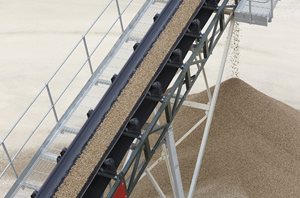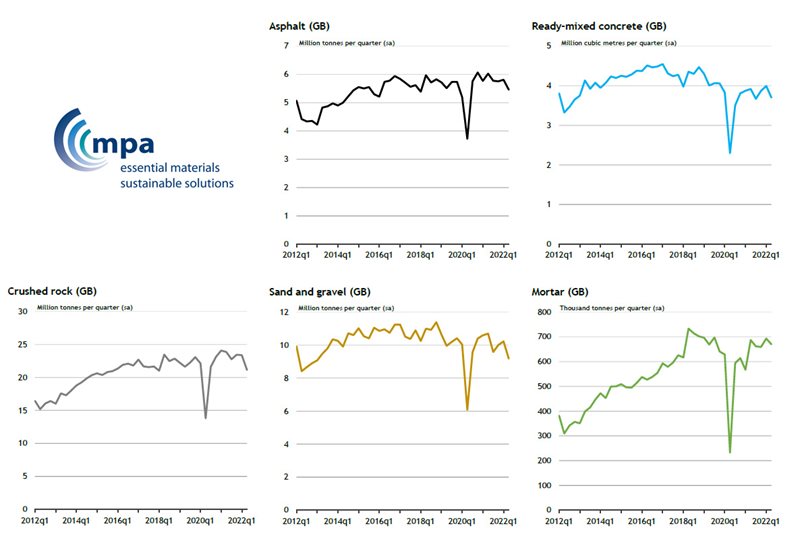 A disappointing quarter for UK producers of mineral products raises concerns that widespread cost inflation for raw materials, energy and labour is starting to negatively impact the sector.
A disappointing quarter for UK producers of mineral products raises concerns that widespread cost inflation for raw materials, energy and labour is starting to negatively impact the sector.
Demand for mineral products, which includes essential construction materials like aggregates, ready-mixed concrete, asphalt and mortar, edged lower in 2022Q2, with sales volumes down on a quarterly basis, according to the Mineral Products Association’s latest industry survey.
The new figures show that the tonnages of asphalt sold in 2022Q2 were 6% lower compared to the previous quarter, 7.4% lower for ready-mixed concrete and 9.8% lower for aggregates (crushed rock, sand and gravel). Asphalt and crushed rock sales have both fallen from near record levels in 2021, while ready-mixed concrete, and sand and gravel sales slipped further below their pre-pandemic levels. Mortar sales were also lower than in 2022Q1 by 3.4%, albeit from a high base and volumes remain supported by housebuilding activity.
These essential ‘heavy-side’ materials are the largest constituent in the construction supply chain, forming the foundations and structures of buildings and infrastructure developments, with MPA producer members supplying over 90% of total market demand in Great Britain. They are primarily used early in a construction project’s timeline, therefore providing a useful indicator of near-term continuity in construction growth.
Survey data from MPA producer members indicates that demand for these materials dropped off markedly from June, with the extended bank holiday and the rail strikes said to have caused some disruption.
However, the main concern is that widespread cost inflation throughout the construction supply chain is starting to negatively impact on construction demand, possibly indicating the start of a more prolonged downturn. All mineral products markets, from the extraction of aggregates to the manufacture of downstream products, have been exposed to significant cost increases for raw materials, energy and labour in the past year.
Producers of energy-intensive ingredients for concrete and lime are finding themselves under considerable pressures. Similarly, asphalt manufacturers have been hit by bitumen prices, which are 30-40% higher than they were a year ago. As costs have to be passed on, the commercial viability of future construction projects may be impacted. In roads for instance, Local Authorities are faced with significant material cost increases for repair and maintenance projects without offsetting increases in their budgets. Anecdotal reports from asphalt producers indicate that some Local Authorities’ projects have been pushed back for review to work around these cost increases, causing further delays to project delivery and increasing overall uncertainty.
Aurelie Delannoy, MPA Director of Economic Affairs, cautions that the recent weakness in mineral products sales, if continued over the second half of the year, would make a contraction unavoidable for the year as a whole for all mineral products monitored. A slowdown in the later part of 2022 had already been anticipated due to the expected feed-through of cost pressures and the increased financial vulnerability of households as real incomes are being squeezed. “This may simply have started to stifle market demand a few months sooner than expected”, she adds.
“The start of the third quarter is also looking challenging. Current ONS data for construction output and new orders remain broadly positive, but prospects for mineral products sales have been dented by the record heatwave in July and the summer rail strikes.”
Mineral products manufacturers are increasingly uneasy over what is likely to happen at the end of 2022 and in 2023, as the impact of inflation and higher costs on the UK economy and construction become more evident. Nevertheless, current construction activity and a robust pipeline of new projects, primarily driven by large infrastructure projects and housebuilding, should continue to support buoyant sales volumes.
Figure 1. Mineral products sales volumes in Great Britain
 Table 1. MPA sales volumes in GB: change on the previous period (seasonally adjusted)
Table 1. MPA sales volumes in GB: change on the previous period (seasonally adjusted)
|
|
Asphalt
|
Ready-mixed concrete*
|
Crushed rock
|
Sand & Gravel
|
Mortar
|
|
2019
|
-0.8%
|
-3.9%
|
-0.7%
|
-5.4%
|
-2.3%
|
|
2020
|
-8.6%
|
-18.2%
|
-9.6%
|
-12.4%
|
-23.5%
|
|
2021
|
12.5%
|
14.1%
|
16.7%
|
13.3%
|
24.4%
|
|
|
|
|
|
|
|
|
2021Q3
|
-4.2%
|
-6.4%
|
-4.6%
|
-10.4%
|
-3.8%
|
|
2021Q4
|
-0.3%
|
5.5%
|
3.0%
|
4.4%
|
-0.4%
|
|
2022Q1
|
0.9%
|
3.3%
|
-0.3%
|
2.2%
|
5.2%
|
|
2022Q2
|
-6.0%
|
-7.4%
|
-9.6%
|
-10.2%
|
-3.4%
|
|
|
|
|
|
|
|
|
4 quarters to 2022Q2 vs. 2019
|
0.4%
|
-7.3%
|
1.7%
|
-5.4%
|
-0.7%
|
* Ready-mixed concrete sales volumes at GB level cover sales from both fixed and site (mobile) plants.
Source: MPA, ONS.
Ends.
About the Mineral Products Association:
The Mineral Products Association (MPA) is the trade association for the aggregates, asphalt, cement, concrete, dimension stone, lime, mortar and silica sand industries. With the merger of British Precast, and affiliation of the British Association of Reinforcement (BAR), the British Calcium Carbonate Federation, the Cement Admixtures Assocation (CAA), CONSTRUCT, Eurobitume, MPA Northern Ireland, MPA Scotland and the UK Quality Ash Association (UKQAA), it has a growing membership of 520 companies and is the sectoral voice for mineral products. MPA membership is made up of the vast majority of independent SME quarrying companies throughout the UK, as well as the 9 major international and global companies. It covers 100% of UK cement and lime production, 90% of GB aggregates production, 95% of asphalt and over 70% of ready-mixed concrete and precast concrete production. In 2018, the industry supplied £16 billion worth of materials and services to the Economy. It is also the largest supplier to the construction industry, which had annual output valued at £172 billion in 2018. Industry production represents the largest materials flow in the UK economy and is also one of the largest manufacturing sectors.
For media enquiries, contact Elizabeth Clements at: Elizabeth.Clements@mineralproducts.org.